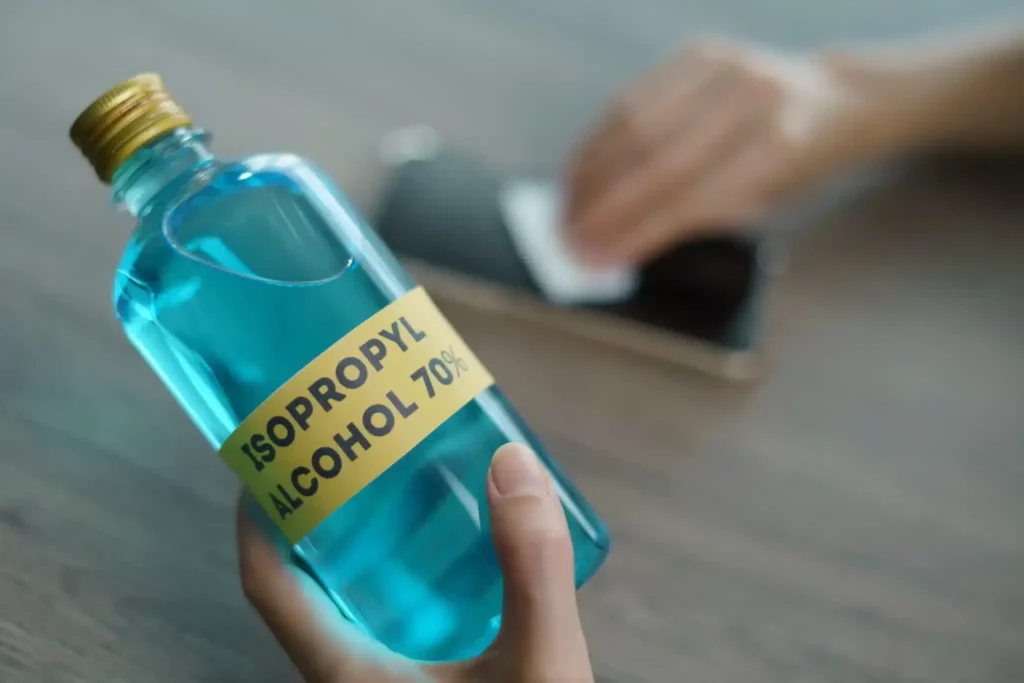
When you Google, “Can rubbing alcohol kill lice?” you get conflicting answers. Some say yes, others say no. Some tell you to do a daily soak in the nasty stuff, while others ask you to buy tons of chemical products at the pharmacy. It is time to clear up the common misconceptions and questions about rubbing alcohol as a head lice treatment.
Rubbing alcohol is usually used in doctor’s offices and at home. But does rubbing alcohol kill lice? To learn more about this, let’s dive in!
Rubbing Alcohol vs. Other Lice Treatments
Although rubbing alcohol is a common ingredient in cleaning products, it is also used as hand sanitizer. Alcohol has antiseptic properties that can kill viruses and bacteria when rubbed on surfaces like your hands.
Even though rubbing alcohol can be used in different ways, there are some drawbacks to using rubbing alcohol as a lice treatment. To elaborate, let’s take a quick look at what rubbing alcohol is.
Rubbing alcohol is either isopropyl alcohol or ethanol-based liquids. The terms “rubbing alcohol” and “isopropyl alcohol” are sometimes interchangeable because they are similar in composition. But, rubbing alcohol is mixed with a certain amount of water, primarily used in open wounds or as a disinfecting solution for hard surfaces. In contrast, pure isopropyl cannot be used directly on your skin.
Risks of Killing Head Lice with Rubbing Alcohol
Rubbing alcohol is sometimes suggested as a home remedy for head lice removal because people think it kills lice. Some believe it will make the lice weak so lice can be brushed out of the hair more quickly. However, rubbing alcohol is not an FDA-approved treatment for head lice. Nor has it been proven to have any effect on head lice.
One of the most common uses of rubbing alcohol is as a disinfectant. It’s often used in the medical field to sterilize surgical tools, and clean skin before injections or blood draws. Besides that, some parents may attempt to use rubbing alcohol to treat head lice. But, there is some risk of using rubbing alcohol on your scalp, including:
Inhalation risks:
If inhaled accidentally, rubbing alcohol can irritate the lungs, causing coughing and shortness of breath. Long-term exposure can cause a person to feel dizzy, confused, faint, or weak. Rubbing alcohol can also cause headaches, nausea, vomiting, and loss of coordination if inhaled directly.
Skin risks:
Rubbing alcohol has a low pH level, which means that when applied to the hair, it can cause damage by stripping off its natural oils. This can lead to dryness of the hair shaft and leave it brittle and more prone to breaking.
Additionally, when you put alcohol onto your head, the pores on your scalp open up. When the pores are open, the alcohol can easily absorb through the skin. This can cause irritation and redness on your scalp. It can be even more irritating if you already have a sensitive scalp.
If you have dandruff or other problems with your scalp, rubbing alcohol can irritate those problems and make them worse. This is especially true if you have a sensitive scalp or skin condition like eczema or psoriasis.
Eye risks:
Rubbing alcohol can cause a stinging sensation when you put it too close to your eyes. It may even be absorbed into your eyes and irritate them. If this happens, flush your eyes with water immediately to wash out the chemical before it causes damage.
Lice Treatments That Work
There are several products on the market for lice treatment. There are two general categories of these products: pesticide-based treatments and non-toxic treatments.
Many products that contain pesticides need multiple treatments putting people at increased risk for exposure to these chemicals. Additionally, lice have become more resistant to pesticide treatments making them less effective.
Licefreee is a safe, effective, and non-toxic over-the-counter (OTC) medication. Licefreee has designed and enhanced products for treating head lice for over 20 years. If you want to kill lice and eggs (also known as nits) use a high-quality fine-toothed comb to see the best results. It is also best to have an anti-lice spray for your home furniture and non-washable materials.
